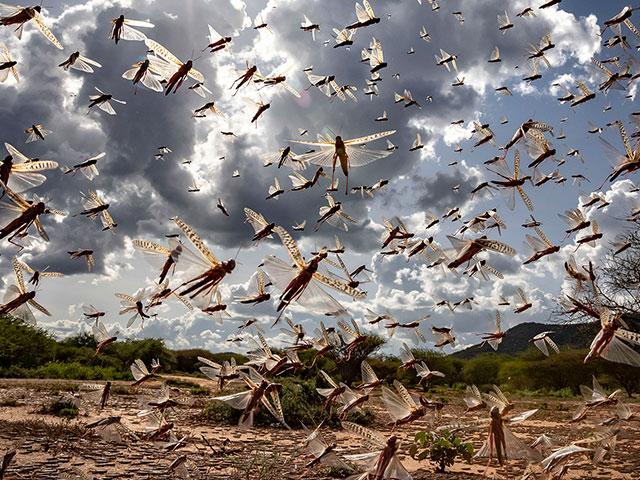
Billions of Locusts Invade in New, Larger Wave as Second Swarm Threatens Africa: 'Extremely Alarming'
A new wave of locusts is threatening Africa with devastation and starvation, even as the COVID-19 pandemic undermines efforts to fight the locust plague.
Parts of the continent already experienced the biggest locust outbreak in 70 years, just weeks before the coronavirus hit. Now a second wave is on its way, with some locust swarms 20 times the size of the first.
Billions of young desert locusts are coming, threatening plants and crops. This second invasion includes more developed locusts known as “young adults,” which are especially voracious eaters.
Some Africans view the locust swarms as more destructive than the coronavirus. And there are predictions that the locust plague might cause the coronavirus to spread even further as people band together, trying to fight off the swarms of locusts from eating all their food.

(PHOTO CREDIT: Sven Torfinn/FAO via AP)
“Everyone is talking about” the locusts, said Yoweri Aboket, a farmer in Uganda. “Once they land in your garden they do total destruction. Some people will even tell you that the locusts are more destructive than the coronavirus. There are even some who don’t believe that the virus will reach here.”
Gardens with essential crops like cassava are in grave danger across Kenya, Ethiopia, South Sudan, Djibouti, Eritrea, Tanzania and Congo.
“The current situation in East Africa remains extremely alarming," a new UN Food and Agriculture Organization assessment said. "An increasing number of new swarms are forming in Kenya, southern Ethiopia and Somalia.”
The Nairobi-based Climate Prediction and Application Center said the locusts are “invading the Eastern Africa region in exceptionally large swarms like never seen before."

(PHOTO CREDIT: Sven Torfinn/FAO via AP)
Meanwhile, coronavirus-related travel restrictions around the world are preventing the importation and delivery of urgently needed pesticides in some areas.
“I think, unfortunately, because of other things going on around the world, people are forgetting about the problem with the locusts. But it’s a very, very real problem," farmer George Dodds told the FAO.
In Ethiopia, six million lives are at risk as the locust outbreak threatens to cause “large-scale crop, pasture and forest-cover loss, worsening food and feed insecurity,” according to the FAO.
And Ethiopia’s agriculture ministry says the problem is worsening as the locust swarms are now appearing in locations where they had not been previously sighted.
This story compiled from Associated Press material.



